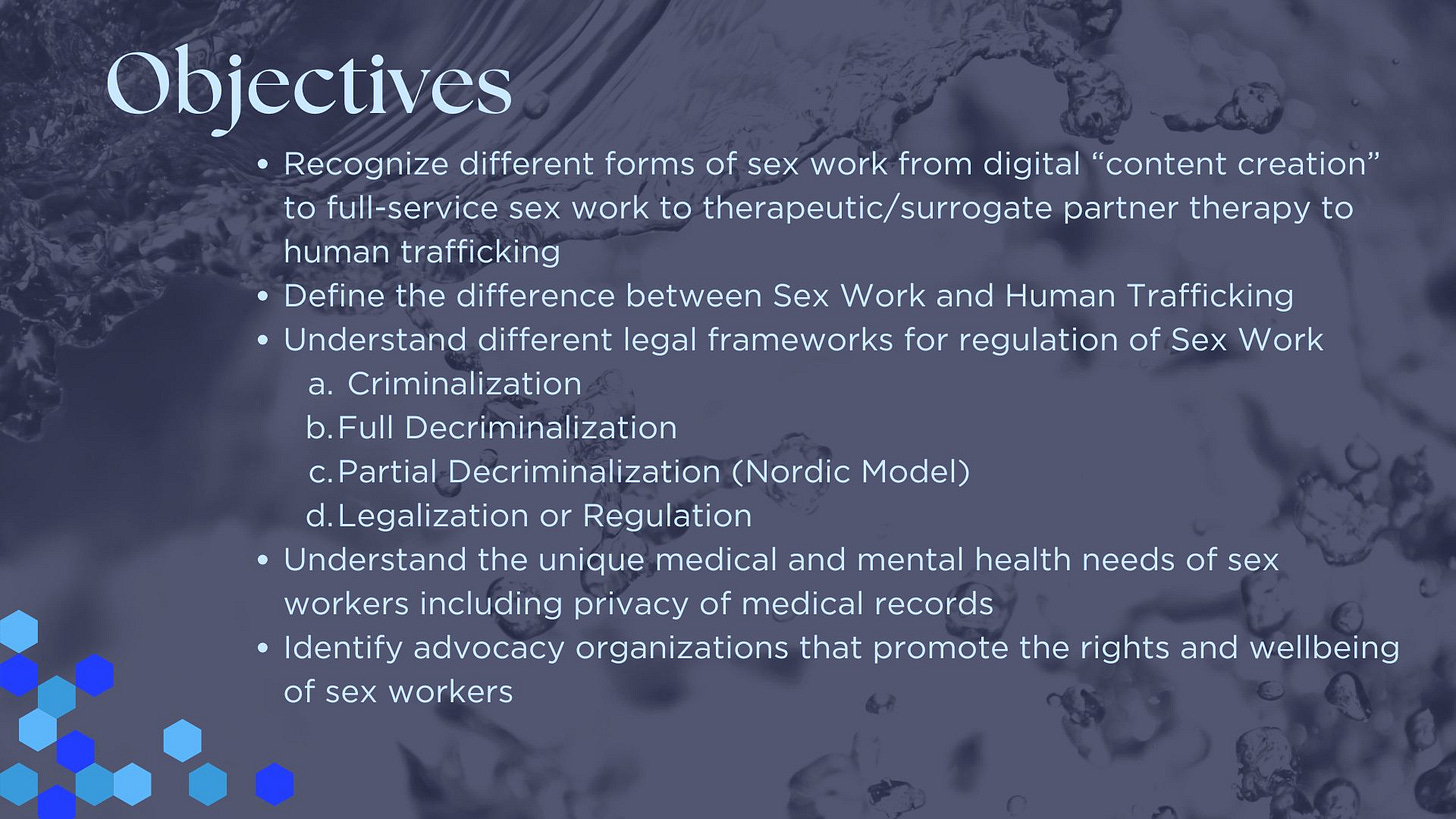Go Ask Alice
Behind the Scenes of my Research on International Sex Work
What comes to mind then you picture a sex worker?
Julia Roberts in Pretty Woman? Cam models? Coeds on sugar dating sites? Brothel workers? Sexting? Strip clubs? Porn? Influencers? Professional Dominatrixes? Street level prostitution? Human trafficking? Therapy?
I invite you to consider that your image of a sex worker has more to do with your own past experiences than it does with the identity of any particular sex worker. If you’re a clinician, I invite you to consider whether your patients might withhold their professional work in this arena and how that might impact the care you’re able to provide.
For the next several weeks, I’ll be preparing for a presentation on the world’s oldest profession. This presentation is for an international audience of clinicians, academics and mental health professionals. Many of whom are thought leaders in the sexual health space.
As I attempt to distill the enormous topic of transactional intimacy into a 45 minute talk, I’m going to leave a lot of what I learn on the cutting room floor. Fortunately, I have Substack to let you in on the nuances of my research.
As I take on the subject, I’m deeply aware of the fact that the story of sex work is not really mine to tell. Some would say that I should sit down and shut up because this isn’t my story. My solution to this very legitimate critique is to talk to as many sex workers as possible and to read the accounts that they’ve written themselves. In addition to my own reflections, I’m going to post some interviews with actual sex workers who have graciously accepted my invitation to share their experiences.
I’m also looking at a variety of organizations who advocate for sex workers’ rights and provide assistance in times of crisis. My goal is to reflect on the common humanity of service providers despite the stigma and shame that’s often cast on this line of work.
When it comes to trading sex for money (or shelter, security, drugs, food, etc), the issue extends far beyond the act of intercourse. Sex work touches on economics, power, labor, law, medicine, mental health, substance use, child abuse, reproductive rights, housing, technology, beauty, religious trauma, shame and the list goes on.
So much of our lives are driven by the desire for sex or the unmet need for human connection. Sex is used to sell everything in our attention economy. Ozympic, Botox and Viagra wouldn’t be multibillion-dollar blockbusters without the drive for sex appeal. Sex (or lack of it) undeniably affects how we maintain our physical and mental health, yet doctors receive essentially no training on the nuances of human sexuality.
I have a few friends who are licensed sex workers at the legal brothels here in Nevada. I’ve written about the brothel industry in an article called “The Courtesans of Nye County”. One of those friends also hosts a private working group for creative writers. When I shared some of the draft work for this project, my dear friend asked a pointed question:
“You’ve read me a list of technical objectives and data that you’re planning to provide. But how do you want your audience to feel at the end of your talk? What’s the message you want them to come away with?”
The point of this project is to make you think. About the role of sex in our lives on an individual as well as on a macro level. Regardless of what country we live in or what language we speak, the vast majority of us crave sexual intimacy. And the need for human connection is universal.
I hope you’ll enjoy coming along on this journey with me.
To kick things off, I’m sharing an interview with Marco Anteros, a Brooklyn-based Surrogate Partner Therapist and Intimacy Coach. We delve into the niche specialty of surrogate partner therapy including how this modality is incorporated into other forms of psychotherapy and healing work. We also discuss training, regulation and safety concerns.
You can learn more about Marco’s work at Anteros.Care.
You can learn more about Surrogate Partner Therapy at International Professional Surrogates Association and Surrogate Partner Collective.
Choosing Focus in 2025
My goal in 2025 is to become a Substack Best Seller. Similar to Savage Love on the back pages in the free city rags of my youth, I want to be the voice on this platform that readers turn to in order to learn about sex and health.
My other goal this year is to become certified by The Menopause Society to provide peri/menopause care to clinical patients.
A million American women enter menopause every year but only 6.8% of surveyed OBGYN residents felt adequately prepared to take care of patients through this season. Why? Because allopathic medicine has a long history of not taking women’s health concerns seriously.
In order to crowdfund my educational efforts, I’m currently offering a 30 minute Zoom call with anyone who supports Under the White House Coat at the Founding Member level. The call can be on the topic of your choosing but I will not offer medical advice. I’m a doctor. But I’m not YOUR doctor.
If you don’t have the bandwidth to commit to a paid subscription, you can contribute to the enterprise by making a donation here.
However you subscribe, I value your attention to this project.
Other Resources :
Revolting Prostitutes: The Fight for Sex Workers' Rights by Juno Mac and Molly Smith
This book by two UK-based sex workers neither glorifies nor demonizes the industry. It is an insightful and nuanced examination of the physical and emotional labor of sex work.
This comprehensive collection of essays delves into the economics and technology surrounding 21st century sex work.





My initial thought was that you borrowed the title of this from a lyric from the very old Jefferson Airplane song “White Rabbit” (“…Go ask Alice, I think she’ll know…”) and now I can’t get the tune out of my head.
I applaud you for delving into this. For years, I worked with domestic violence and sexual assault victims. Then we started seeing victims of those things who were also sex or labor trafficked, or both. So I wrote a grant in 2008 and we started a program to train the public and to serve these victims, as well as to coordinate our work with federal, state, and local law enforcement and state and federal relief agencies.
My education was staggering at this point. Every preconceived notion I had was shattered. No more so than learning the true distinction between those who use their personal agency as sex workers and those who are forced or coerced into becoming victims. Sometimes there is overlap of course, but definitely not always, and I began to see how criminalizing sex work was hurting both legit sex workers and victims of sex trafficking, who just get pushed more underground and away from our help when they are potentially looked at as criminals or when johns are prosecuted.
All this to say, it is refreshing to see a doctor take this on. Thank you.